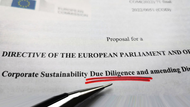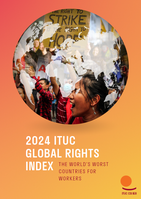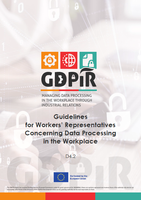 |
| Download pdf file | Newsletter archives |
| Dieser Newsletter auf Deutsch | Cette newsletter en français |
1. Latest developments in Brussels |
 |
|
Left-wing group chairs the committee responsible for revising the EWC Directive
The left-wing parliamentary group last chaired the committee from 2014 to 2019 with Thomas Händel, a former trade union secretary (IG Metall) from Germany. The "Händel Report" named after him on the legal protection of transnational company agreements has not been worked on for years (see report in EWC News 3/2013). In one of her first parliamentary questions, the new committee chair criticised the cross-border use of strike-breakers by Tesla during the industrial action in Sweden (see report in EWC News 2/2024).
Report on the priorities of the new chairwoman Report on her election to the European Parliament The parliamentary question on the Tesla labour dispute Romanian Social Democrat proposed as Commissioner for Employment and Social Affairs
The Commissioner-designate has been a member of the Romanian government on several occasions and a member of the European Parliament since June 2024. She is to succeed the Luxembourg Social Democrat Nicolas Schmit, who has been responsible for employment, social affairs and inclusion since 2019 (see report in EWC News 3/2019). Schmit was no longer nominated by his country because the Social Democrats in Luxembourg have been in opposition since November 2023. The new Commission is expected to take office on 1 December 2024. Before that, public hearings will be held in the European Parliament, followed by a formal confirmation.
Curriculum vitae of the new Commissioner The responsibilities of the new Commissioner
The Hans Böckler Foundation had already drawn up a list of demands on collective labour law in May 2024. It contains topics that the European Commission should tackle in the new term of office, divided into three chapters:
1. More rights for European works councils. The Hans Böckler Foundation identifies all the problems with the existing EWC directive and proposes detailed improvements.
2. Minimum standards for co-determination in supervisory boards and closing loopholes in the SE directive. A new framework directive on information, consultation and participation of employees is called for, which consolidates all existing directives and introduces co-determination on supervisory boards in all EU countries where it does not yet exist (see report in EWC News 4/2021).
3. Sustainable corporate governance as an official goal of EU policy. Prospects for jobs and production sites, regions with a high quality of life and employee involvement should be given priority over the generation of short-term profits for investors.
Download the catalogue of demands |
2. Teleworking and the right to disconnect |
 |
|
Position statements from the social partners are available
The employers' associations consider such a directive to be superfluous. It would be sufficient to better monitor the existing rules on rest periods and not to add an additional right to disconnect. The European Commission should avoid regulating all the details and instead give the Member States a wide margin of flexibility. The ETUC, on the other hand, is calling for this new EU directive. Teleworking must remain voluntary and employees should also have the right to work at the employer's premises. The right to disconnect is intended to protect the health and safety of employees, regardless of whether they work from home or not. The ETUC wants to promote collective bargaining in order to achieve the objectives of the future directive. This is also what the CEC European Managers federation calls for in its response of 4 July 2024, warning against overregulation and only wishing to set minimum standards and guidance, just like the Scandinavian trade unions.
Position statement from BusinessEurope The opinion of the CEC European Managers federation New teleworking law in Austria
Explanation of the contents of the law (page 14) Full text of the Teleworking Act Practical experience in France
As there is no co-determination in France, the employer does not generally negotiate with the works council. There are no shop-floor agreements in the German sense. Only the (in-house) trade union sections can conduct negotiations and conclude a company collective bargaining agreement. However, there is no obligation for employers to collectively regulate the right to disconnect with the trade unions. If there is no company collective bargaining agreement, the employer must unilaterally draw up a charter after consulting the works council. It should also include training and awareness-raising measures for employees and managerial staff in order to promote the sensible use of digital workplace resources. In an article for the Paris office of the Friedrich Ebert Foundation in mid-July 2024, French trade unionists take a critical view of the law. The issue has been insufficiently regulated in companies. There is a lack of indicators to monitor the measures introduced. A committee with full-parity representation on "Quality of life at work and the right to disconnect" should therefore be introduced by law in all companies.
The contribution of the French trade unionists CGT website on the right to disconnect |
3. Transposition of EU legislation |
 |
|
Transposition problems with whistleblower protection
Such delays have forced the European Commission to take action. Infringement proceedings were initiated against several countries or complaints were submitted to the European Court of Justice. On 25 April 2024, the judges in Luxembourg imposed fines on Poland: a lump sum of €7 million and a daily fine of €40,000 until the requirements are fulfilled. The Polish parliament only passed the corresponding legislation on 14 June 2024.
The European Commission's report reveals shortcomings in the transposition of the directive. Many countries lack confidential reporting channels and adequate protection for potential whistleblowers. Some national laws need to be improved, in areas such as the material scope of application, the conditions of protection and the measures to protect against retaliation, in particular for the exclusion of liability and penalties. Actions against Luxembourg, Hungary, Estonia, Germany and the Czech Republic are currently pending before the European Court of Justice. A guide on the topic for employee representatives was published in December 2020 (see report in EWC News 1/2021).
European Court of Justice ruling Download the report from the European Commission Critical assessments of the Directive's transposition Supply Chain Directive must be transposed by July 2026
The directive aims to strengthen human rights, prevent child and forced labour, environmental pollution and the destruction of natural heritage. The member states now have two years to transpose the directive into national law. Some countries already have laws in place, e.g. Germany has had a supply chain due diligence law since January 2023 (see report in EWC News 1/2023). Such laws must now be adapted to the minimum requirements of the new EU directive.
Guidance for sustainability reporting
The directive on Corporate Reporting obligations on sustainability, environmental, social and human rights has been in force since January 2023 (see report in EWC News 1/2023). Around 49,000 companies with 500 or more employees are affected. On 7 August 2024, the European Commission published a list of answers to frequently asked questions (FAQs) and its views on the interpretation of this directive. The first affected companies will have to report on the 2024 financial year in 2025.
Full text of the Due Diligence Directive Background report by the trade union ver.di on the situation in Germany The FAQ on sustainability reporting Regulation of artificial intelligence (AI)
Report on the adoption of the regulation Explanation of the regulation's content Full text of the AI Regulation
Forthcoming Event
The content of the new AI Regulation and its significance for works councils will be discussed at our Hamburg conference on 28 January 2025.
|
4. Individual country reports |
 |
|
No employee representatives on Spanish supervisory boards for the time being
Report on the vote in parliament Background report on the debate
Unlike in the German-speaking and Nordic countries, the model of a social partnership with employee participation in supervisory boards is not widespread in Southern Europe (including Belgium) and has been rejected by the trade unions for a long time. It was not until October 2014 that a historic compromise was reached in the European Trade Union Confederation, when all national trade unions supported the introduction of corporate co-determination for the first time (see report in EWC News 4/2014). France is the only exception in Southern Europe, where employee participation in supervisory boards has been in place for some time and has even been expanded in recent years (see report in EWC News 4/2022). Support also comes from the European Parliament, which called for co-determination on supervisory boards in all EU countries in a resolution on "Democracy at Work" in December 2021 (see report in EWC News 4/2021). Reinforcing workers' rights in the United Kingdom
Work should again be made worthwhile ("Make Work Pay - Delivering A New Deal for Working People"). The aim is to combat poor wages and exploitative working conditions and reinforce workers' rights. In future, all employees will be entitled to parental leave, sick pay and protection against unfair dismissal from the first day of work, to work from home and to disconnect. "Fire and rehire" practices are to be banned. This consists of ignoring collective agreements and dismissing any employee who does not want to accept worse working conditions (see report in EWC News 1/2022). A further bill is intended to ensure the full right to equal pay for ethnic minorities and disabled people. The establishment of an independent authority ("Fair Work Agency") is planned to monitor the new rules.
Fewer restrictions on trade union activities
In the United Kingdom, there is neither co-determination nor works councils in the continental European sense. Therefore, the contractual recognition of a trade union as a collective bargaining party for company agreements is the only way to establish fully-fledged employee representation (see report in EWC News 3/2010). However, the legal procedure for recognising trade unions in companies is complicated and sets high hurdles. These regulations are to be simplified. It should also be possible to organise ballots electronically. The British trade unions cannot decide this themselves, but must comply with the legal rules from the Thatcher era. As there have been no sectoral collective bargaining agreements for many years, the government is aiming for a "Fair Pay Agreement" (FPA) in the care sector, a universally binding sectoral collective agreement that will serve as a model for other low-wage sectors.
Labour brochure on the New Deal in labour law The opinion of the British Trade Union Confederation (TUC) Overview of the planned changes to labour law Finland wants to facilitate deviations from collective bargaining agreements
Many industry level agreements in Finland are universally binding and must be applied by all companies. If there is no union in the company, the workforce should in future elect a representative (independent of the union) to negotiate company deviations from the collective agreement. They should receive the same time-off work and protection as the union representatives, and the agreements must be submitted to the health and safety authority for approval. Disputes between collective bargaining parties, on the other hand, will be brought before the labour courts. The SAK trade union confederation believes that this bill "destroys the Nordic labour market model", which is based exclusively on union structures. There are no works councils in Finland. The law is scheduled to come into force on 1 January 2025.
The right-wing conservative coalition has been in office since June 2023 (see report in EWC News 3/2023). Restrictions on the right to strike have been in force since 18 May 2024, and on 9 September 2024, the government formed working groups with the social partners to discuss measures to simplify layoffs and increase the use of temporary contracts.
Working groups on individual labour law Overview of labour market reforms Trade unions' assessment of the reforms Analysis by the Friedrich Ebert Foundation |
5. British EWC law after Brexit |
 |
|
European Works Council avoids legal action in Ireland
Like all companies that have applied British law since Brexit, the British Council's EWC is also subject to the law of an EU country, in this case Ireland. In November 2021, there was a dispute with central management over the disclosure of confidential information in Italy. The EWC therefore attempted to conduct a conciliation procedure under Irish law, but this was not possible due to ambiguities in Irish EWC law. It then lodged a complaint with the European Commission, which is one of the triggers for the infringement proceedings against the Irish government (see report in EWC News 2/2022). This experience prompted the EWC to take legal action in the UK rather than Ireland.
The cause of the legal dispute is the decision by central management to transfer certain functions such as IT, finance, HR and procurement to an external service provider without adequately informing and consulting the EWC. It is also disputed whether central management can unilaterally decide to hold a video conference instead of a face-to-face meeting in exceptional circumstances. The CAC had already ruled in February 2018 that a conference call does not constitute an extraordinary meeting (see report in EWC News 1/2018). This is not the first legal dispute for the British Council. The EWC made legal history in April 2013 when the CAC ruled to define the characteristics of a consultation procedure (see report in EWC News 2/2013). EWC agreement provides an escape route from UK law
The EWC was of the opinion that HSBC would continue to be subject to UK EWC law after Brexit, which replaced the term "member state" with "relevant state" and is still in force today. As recently as June 2023, the Court of Appeal ruled at third instance that the airline easyJet must continue to apply British law (see report in EWC News 3/2023). However, there are two key features of HSBC that led to a different ruling by the court. Firstly, easyJet does not have an EWC agreement and worked with an EWC "by law" on the basis of the subsidiary requirements; secondly, the central management wanted to completely dissolve the EWC in the course of Brexit and instead establish a special negotiating body under German law. In contrast, HSBC has had a legally binding EWC agreement in place since October 2015 (see report in EWC News 2/2016). The EWC was able to continue working after Brexit, albeit without the British delegates. The court ruling is based on a precise analysis of the wording of the EWC agreement, which solely refers to "Member States of the European Economic Area".
Forthcoming event
The impact of Brexit on European works councils will be a topic at the next EWC conference on 27 and 28 January 2025 in Hamburg.
|
6. Completely opposite court rulings |
 |
|
EWC legal dispute in Ireland on its way to the High Court
The Irish industrial relations system has historically had no works councils. For this reason, the characteristics of works council systems are a foreign element in the Irish legal system and there is a lack of adequate regulations. However, Ireland finds this much more difficult than Britain, where there have also been no works councils historically, but where EWC law quickly adapted to the new situation. With its ruling, the Labour Court confirmed - presumably unintentionally - precisely the arguments of the European Commission that led to the infringement proceedings against the Irish government in May 2022 (see report in EWC News 2/2022).
US company ignores fundamental EWC rights
The starting point of the whole legal dispute is the behaviour of the central management of the US company Verizon Communications, which is deliberately and regularly disregarding the rights of the EWC and is attempting to obstruct its activities. Management is angry with the EWC because it went to court and obtained a fine in London in October 2020, the highest in the history of EWC legislation throughout Europe (see report in EWC News 3/2020). As a result, the central management cancelled the EWC agreement, which was subject to British law. Since then, the EWC has been operating on the basis of the subsidiary requirements under Irish law.
The Labour Court ruling overturned decisions made by the first instance Workplace Relations Commission in April 2023 (see report in EWC News 2/2023). Due to the fundamental importance for a large number of European works councils (12 to 15% of all EWC agreements are based on Irish law), an appeal to the High Court was lodged on 1 October 2024. This also concerns the payment of legal fees for the ongoing proceedings. The issue has already been discussed in the Irish Parliament (see report in EWC News 1/2023).
The ruling on the payment of experts The ruling on payment for attending a seminar Press report on the legal consequences of the ruling
Forthcoming event The hearing before the High Court is expected to take place in summer 2025. In this context, we are planning an EWC seminar in Dublin, which will include a visit to the High Court hearing. First court ruling on legal fees in Austria
The costs of administrative penal proceedings against the managing directors of the Group, which the EWC initiated in December 2021, will not be covered (see report in EWC News 4/2021). The applications were rejected at the time because there are no fines for violations of EWC rights in Austria. Other EU countries provide for fines, even though they are considered to be too low (e.g. in Germany €15,000 as the maximum fine). Austria is the only EU country that does not provide for any penalties at all, which is contrary to the recitals 35 and 36 of the EU directive. In the opinion of the Labour and Social Court of Vienna, an EWC may not challenge this inadequate transposition of EU law in court, which is why the legal fees for this do not have to be reimbursed. As both parties have waived their right to appeal, the judgement is final in all respects. |
7. Current examples of supervisory board-level co-determination |
 |
|
Escape from co-determination reversed
IG Metall and the works council agreed to the reduction of 340 jobs without compulsory redundancies. The family-owned business has 7,000 employees in Germany, including 3,300 at its headquarters in Papenburg alone. Lower Saxony's prime minister Stephan Weil (Social Democrats) had formulated one condition for state aid to overcome the financial bottleneck: the company's headquarters must return to Germany. The Meyer Neptun Group relocated its headquarters to Luxembourg Airport in September 2015 (see report in EWC News 4/2015). The relocation back to Germany will then be accompanied by the establishment of a supervisory board with co-determination and a group works council. Neither of these currently exist.
Supervisory Board with full-parity co-determination dissolved
The employee side previously occupied ten out of 20 seats on the supervisory board, including three external officers from the trade union ver.di. They have now all lost their seats. However, the general works council remains in place as the umbrella body for the local works councils. Legally, it would have been possible to dissolve this as well (see report in EWC News 2/2018). Collective bargaining negotiations are currently underway for a company collective agreement. More than 20,000 jobs have been cut at Galeria in just under ten years. In 2020 there were still 171 stores, but in the future not even half of them will remain.
Press release from ver.di on the dissolution of the supervisory board Press release from ver.di on the collective bargaining negotiations Nintendo secures co-determination on the Supervisory Board
The SE Employee Participation Agreement was signed on 13 December 2023 and goes beyond the standard rules of the SE directive in certain aspects. It applies to the European Single Market, the United Kingdom and Switzerland. Like the British EWC law after Brexit, it refers to "relevant states" (see report in EWC News 2/2021). The new SE works council has 15 members, five of whom are from Germany and two from Spain. It is responsible for matters that affect 10% of the workforce in each of two countries. As the units outside Germany are very small, this threshold is quickly reached. The members of the SE works council have a right of access to all branches in Europe, but must render their opinions quickly. Consultation procedures are to last a maximum of six weeks.
Inclusion is given high priority
The steering committee consists of the chairperson and deputy chairperson, who come from two different countries and can hold up to four meetings a year. There is also a Diversity and Inclusion Officer who can discuss these topics with employees in all branches. The establishment of further committees is possible. The SE works council can post content on the intranet without prior approval from central management. In the event of differences of opinion regarding the interpretation of the SE agreement, an arbitration board with an impartial chairman is established. The SE works council elects the employee representatives to the supervisory board (currently there is only one mandate, as the supervisory board only has three members). |
8. European Works Council agreements |
 |
|
French utilities and waste management group reinforces occupational health and safety
Veolia made a commitment to occupational health and safety to the EWC back in December 2012. This was only a unilateral declaration by the company (see report in EWC News 1/2013). The new agreement incorporates the national social dialogue bodies. These forums fill a gap in all countries where the legislator does not provide for central or group works councils (e.g. Spain). They were already put in place when the EWC was established in October 2005. Minimum social standards for layoffs
The 14,800 employees in the European Economic Area are represented by 23 EWC members; countries with fewer than 80 employees have no seat. Switzerland (the company's headquarters) is fully integrated into the EWC. It is a mixed body that meets once a year under the chairmanship of the employer ("Euroforum"). Plenary sessions and all extraordinary meetings take place in person. Training is only provided in combination with EWC meetings. The catalogue of information rights is extensive and goes beyond the EU directive. There is no fixed deadline for consultation procedures; instead, a specific timetable is negotiated in each individual case. EWC members can visit any location in Europe at the invitation of local employee representatives. A special feature is the social minimum standards for redundancies. These are modelled on the guidelines that were included in the EWC agreement of the Zurich Insurance Group in February 2016 (see report in EWC News 1/2016). Canadian automotive supplier establishes EWC in Sweden
The term of office for the delegates (Sweden, Norway, Belgium, Portugal, Czech Republic and Germany) is two years, and the chair is elected each year. The select committee consists of five members. Every quarter the central management informs the entire EWC about the current business situation, once a year in a face-to-face meeting, otherwise by video conference. In the event of a crisis, extraordinary meetings of the select committee take place. The catalogue of topics for information and consultation is formulated very openly and is merely a list of examples.
Swedish style
The agreement is characterised by the pragmatic cooperation that is usual in Sweden and largely avoids detailed legal provisions. For example, the consultation procedure is not described at all. The very short text sometimes contains only lists without complete sentences. This is in complete contrast to EWC agreements that are extensively formulated in legal terms, as is usual under German or French law. Another feature shows that Sweden does not have works councils and that employee representation at the workplace is exclusively the responsibility of the trade unions. At Plasman, the appointment of experts is not carried out by the EWC, but exclusively by the Swedish trade unions.
Features of employee representation in Sweden |
9. The view beyond Europe |
 |
|
Global Works Council signs social agreement
Interview on the contents of the agreement Siemens without employee representation in the USA
Report on the events in Sacramento The campaign website of the two US unions Parcel delivery company boosts social commitment
The steering committee of the two contracting parties, which meets every six months, will be maintained. New elements include technical working groups, a grievance mechanism for all countries and a detailed description of conflict resolution from the local to the global level. Greater importance is attached to occupational health and safety, and principles of fairness are much more closely monitored with regard to suppliers and subcontractors. The agreement also provides for a restriction on subcontracting, which is very widespread in the parcel industry. In March 2024, GeoPost's EWC agreement had already been revised (see report in EWC News 2/2024).
Full text of the framework agreement Explanation by the CGT trade union |
10. Projects and websites |
 |
|
Research project to study influence of internet platforms
Digital transformation in the financial services sector
Blog on labour and the global economy
The work of the Global Labour University What positions are taken by which MEP?
The German members of the Committee on Employment and Social Affairs |
11. New publications |
 |
|
Innovation-driven growth in Central and Eastern Europe?
Download of individual country studies Global inventory of workers' rights
Guidance on data protection in the workplace
Download the guidelines on data protection Download the country report on Germany Download the brief description of Germany Overview of the project and all other language versions Current state of industrial relations in 28 countries
Download the list of links for all countries The European collective bargaining report of the Hans Böckler Foundation |
12. The EWC Academy: Examples of our work |
 |
|
Danish construction materials retailer holds retroactive EWC negotiations
EWC training in Spanish IT company
The group has its headquarters in Madrid and the EWC agreement is subject to Spanish law. The EWC has existed since 2003 and has 24 members from 17 countries, including observers from Switzerland and the UK. The EWC members were particularly interested in the organisation of information and consultation procedures, the consequences of Brexit for European works councils, recent court rulings and possible implications of the planned new EU directive for their EWC agreement.
Life science group has to restructure
|
13. Forthcoming seminar dates |
 |
|
The EWC Academy and its forerunner organisation have been conducting conferences and seminars for the members of European works councils, SE works councils and special negotiating bodies since January 2009. So far, 939 employee representatives from 317 companies have taken part including many of them on multiple occasions. This represents around 25% of all transnational works council bodies in Europe. In addition, there are numerous in-house events and guest lectures given to other organisations.
Overview of forthcoming seminar dates Seminar on the renegotiation of EWC agreements in Würzburg
Seminar for works council members in groups based outside Germany
A second seminar will be held in parallel at Steinburg castle in Würzburg from 12 to 15 November 2024, which deals with the significance of "external control" by a foreign parent company for co-determination. It is aimed at works council members at all levels and aims to strengthen their ability to act in this special environment. Another focus is the evaluation of IT projects and their organisation through company-level agreements.
17th Hamburg Conference for European and SE Works Councils
The programme for the conference Works council seminar in Gdańsk
Introductory seminar at Montabaur Castle
Report from a previous seminar in Montabaur In-house events
|
14. Imprint |
 |
|
EWC News is published by: D-20459 Hamburg
Distributor of the German version: 24,197 readers |
 |
 At its constitutive meeting on 23 July 2024, the European Parliament's Committee on Employment and Social Affairs elected its new bureau. Li Andersson from Finland, who was newly elected to The Left group of the European Parliament, was appointed Chair. She previously spent four years as Minister of Education in Finland's former red-green government. The committee is responsible for all directives in employment and social legislation, including the EWC Directive.
At its constitutive meeting on 23 July 2024, the European Parliament's Committee on Employment and Social Affairs elected its new bureau. Li Andersson from Finland, who was newly elected to The Left group of the European Parliament, was appointed Chair. She previously spent four years as Minister of Education in Finland's former red-green government. The committee is responsible for all directives in employment and social legislation, including the EWC Directive. On 17 September 2024, Ursula von der Leyen presented 26 commissioners for the new term of office until 2029. Each EU member state can propose one candidate, and the President of the European Commission is responsible for allocating portfolios. Roxana Mînzatu from Romania was named for the new People, Skills and Preparedness portfolio. It represents one fifth of the EU budget (€235 billion) and includes labour law with the EWC directive.
On 17 September 2024, Ursula von der Leyen presented 26 commissioners for the new term of office until 2029. Each EU member state can propose one candidate, and the President of the European Commission is responsible for allocating portfolios. Roxana Mînzatu from Romania was named for the new People, Skills and Preparedness portfolio. It represents one fifth of the EU budget (€235 billion) and includes labour law with the EWC directive. To-do list for the European Commission
To-do list for the European Commission On 25 June 2024, the European Trade Union Confederation (ETUC) and the confederation of employers' associations BusinessEurope presented their positions on a planned EU directive on fair teleworking and the right to disconnect. The European Commission launched the first phase of consultation with the European social partners on 30 April 2024 (see
On 25 June 2024, the European Trade Union Confederation (ETUC) and the confederation of employers' associations BusinessEurope presented their positions on a planned EU directive on fair teleworking and the right to disconnect. The European Commission launched the first phase of consultation with the European social partners on 30 April 2024 (see  On 4 July 2024, the National Council passed a new legal regulatory framework for teleworking. The "Teleworking Act" comes into force on 1 January 2025 and contains regulations for labour law, tax law and social insurance. It distinguishes between "teleworking in the narrower sense" (in one's own home, with relatives or in coworking spaces) and "teleworking in the broader sense" (all other locations, e.g. in a park, café or hotel). In the first case, the journey to and from work is covered by accident insurance if the distance corresponds to the usual journey to work. In the second case, insurance cover is only provided for the activity itself, but not for the journey to work. The law stipulates that teleworking and the places where it is carried out must be set out in writing in a teleworking agreement. It was adopted by a large majority. Only the Social Democrats voted against it because, in their opinion, accident insurance cover on the way to and from work is not extensive enough.
On 4 July 2024, the National Council passed a new legal regulatory framework for teleworking. The "Teleworking Act" comes into force on 1 January 2025 and contains regulations for labour law, tax law and social insurance. It distinguishes between "teleworking in the narrower sense" (in one's own home, with relatives or in coworking spaces) and "teleworking in the broader sense" (all other locations, e.g. in a park, café or hotel). In the first case, the journey to and from work is covered by accident insurance if the distance corresponds to the usual journey to work. In the second case, insurance cover is only provided for the activity itself, but not for the journey to work. The law stipulates that teleworking and the places where it is carried out must be set out in writing in a teleworking agreement. It was adopted by a large majority. Only the Social Democrats voted against it because, in their opinion, accident insurance cover on the way to and from work is not extensive enough. In August 2016, France became the first European country to introduce the right to disconnect on a statutory basis. In addition to the individual entitlement of employees, the responsibility of the works council was also enshrined in the Labour Code. Since January 2017, the employer must report on the establishment of mechanisms to regulate the use of digital tools and consult with the works council to ensure compliance with rest and holiday periods.
In August 2016, France became the first European country to introduce the right to disconnect on a statutory basis. In addition to the individual entitlement of employees, the responsibility of the works council was also enshrined in the Labour Code. Since January 2017, the employer must report on the establishment of mechanisms to regulate the use of digital tools and consult with the works council to ensure compliance with rest and holiday periods. On 3 July 2024, the European Commission published a report on the transposition of the Directive on the protection of persons who report breaches of Union law. The so-called "Whistleblower Directive" has been in force since December 2019 and was supposed to be integrated into national law within two years (see
On 3 July 2024, the European Commission published a report on the transposition of the Directive on the protection of persons who report breaches of Union law. The so-called "Whistleblower Directive" has been in force since December 2019 and was supposed to be integrated into national law within two years (see 
 The AI Regulation has been in force since 1 August 2024. The EU's legislative institutions had already agreed on its content in December 2023 (see
The AI Regulation has been in force since 1 August 2024. The EU's legislative institutions had already agreed on its content in December 2023 (see 
 On 23 April 2024, the left-wing Sumar parliamentary group failed with a motion that the government should present a law on corporate co-determination. The responsible committee of the Spanish parliament rejected the motion by 19 votes, while the governing parties supported it with 17 votes. Spain has a minority government that has to seek majorities from other parties on each occasion (see
On 23 April 2024, the left-wing Sumar parliamentary group failed with a motion that the government should present a law on corporate co-determination. The responsible committee of the Spanish parliament rejected the motion by 19 votes, while the governing parties supported it with 17 votes. Spain has a minority government that has to seek majorities from other parties on each occasion (see  Keir Starmer has been British Prime Minister since 5 July 2024. The Labour Party won a landslide victory in the early general election the day before, ending 14 years of government by the conservative Tories. Within the first 100 days, the new government wants to make "the biggest improvement to workers' rights in a generation", in particular through a new Employment Law.
Keir Starmer has been British Prime Minister since 5 July 2024. The Labour Party won a landslide victory in the early general election the day before, ending 14 years of government by the conservative Tories. Within the first 100 days, the new government wants to make "the biggest improvement to workers' rights in a generation", in particular through a new Employment Law. On 5 September 2024, the Finnish government submitted a bill to parliament that would make it easier for employers to deviate from collective agreements. Currently, such deviations are only possible if they are explicitly provided for in the collective bargaining agreement and the company belongs to an employers' association. Such deviations are then negotiated by union representatives in the company. In future, deviations will be allowed by law, particularly in companies that do not belong to an employers' association and where there is no trade union representation in the company. In Finland, 59% of all employees are members of a trade union, and the trend is downward.
On 5 September 2024, the Finnish government submitted a bill to parliament that would make it easier for employers to deviate from collective agreements. Currently, such deviations are only possible if they are explicitly provided for in the collective bargaining agreement and the company belongs to an employers' association. Such deviations are then negotiated by union representatives in the company. In future, deviations will be allowed by law, particularly in companies that do not belong to an employers' association and where there is no trade union representation in the company. In Finland, 59% of all employees are members of a trade union, and the trend is downward. On 23 May 2024, the EWC of the British Council language and culture institute filed a complaint with the Central Arbitration Committee (CAC). The CAC in London continues to be the first instance in EWC law, as the British EWC Act was not abolished after Brexit. In June 2023, the Court of Appeal for England and Wales ruled in principle that companies headquartered in the UK must continue to apply British law (see
On 23 May 2024, the EWC of the British Council language and culture institute filed a complaint with the Central Arbitration Committee (CAC). The CAC in London continues to be the first instance in EWC law, as the British EWC Act was not abolished after Brexit. In June 2023, the Court of Appeal for England and Wales ruled in principle that companies headquartered in the UK must continue to apply British law (see  On 4 July 2024, the Employment Appeal Tribunal for England and Wales rejected the appeal of HSBC's European works council against two decisions of the Central Arbitration Committee (CAC) from 2021 (see
On 4 July 2024, the Employment Appeal Tribunal for England and Wales rejected the appeal of HSBC's European works council against two decisions of the Central Arbitration Committee (CAC) from 2021 (see  On 27 August 2024, the Labour Court in Dublin declared that it had no jurisdiction to rule on an EWC legal issue. The Irish EWC Act only provides for legal recourse for individual claims, but not for collective disputes. This excludes European works councils from the rule of law, which is a fundamental problem and hardly compatible with EU law. If the court ruling becomes legally binding, all companies in Ireland could completely ignore the EWC directive in future without any possibility for taking legal action. Since Brexit, the country ranks third as preferred location for European works councils, just behind Germany and France (see
On 27 August 2024, the Labour Court in Dublin declared that it had no jurisdiction to rule on an EWC legal issue. The Irish EWC Act only provides for legal recourse for individual claims, but not for collective disputes. This excludes European works councils from the rule of law, which is a fundamental problem and hardly compatible with EU law. If the court ruling becomes legally binding, all companies in Ireland could completely ignore the EWC directive in future without any possibility for taking legal action. Since Brexit, the country ranks third as preferred location for European works councils, just behind Germany and France (see  On 30 August 2024, the Labour and Social Court of Vienna ruled that a European works council is entitled to full reimbursement of all legal fees incurred in proceedings relating to labour law. The central management of Mayr-Melnhof Packaging must pay all legal fees, default interest and other ancillary costs incurred by the EWC totalling almost €100,000 for a legal dispute spanning three instances up to the Supreme Court. The legal dispute itself, the financing of which was previously unresolved, ended in August 2023 (see
On 30 August 2024, the Labour and Social Court of Vienna ruled that a European works council is entitled to full reimbursement of all legal fees incurred in proceedings relating to labour law. The central management of Mayr-Melnhof Packaging must pay all legal fees, default interest and other ancillary costs incurred by the EWC totalling almost €100,000 for a legal dispute spanning three instances up to the Supreme Court. The legal dispute itself, the financing of which was previously unresolved, ended in August 2023 (see  On 3 July 2024, the management of Meyer shipyard in Papenburg (Lower Saxony) reached an agreement with the IG Metall trade union and the works council on key points of a restructuring plan. The company, known worldwide for its cruise ships, is currently experiencing its biggest crisis since it was founded in 1795. More than €2.8 billion must be raised by end of 2027 to pre-finance the construction of new ships, for which state guarantees are required. The state will temporarily take over 80% of the shipyard shares.
On 3 July 2024, the management of Meyer shipyard in Papenburg (Lower Saxony) reached an agreement with the IG Metall trade union and the works council on key points of a restructuring plan. The company, known worldwide for its cruise ships, is currently experiencing its biggest crisis since it was founded in 1795. More than €2.8 billion must be raised by end of 2027 to pre-finance the construction of new ships, for which state guarantees are required. The state will temporarily take over 80% of the shipyard shares. Galeria, the second largest group of department stores in Europe, has ended its third insolvency proceedings in four years and has been operating as a limited liability company under Luxembourg law since 1 August 2024. This legal form does not provide for a supervisory board. Although Galeria is still based in Essen and has 12,000 employees in 83 shops in Germany, the Co-Determination Act no longer applies. According to the insolvency administrator, the financial costs for the supervisory board totalled around €1 million per year.
Galeria, the second largest group of department stores in Europe, has ended its third insolvency proceedings in four years and has been operating as a limited liability company under Luxembourg law since 1 August 2024. This legal form does not provide for a supervisory board. Although Galeria is still based in Essen and has 12,000 employees in 83 shops in Germany, the Co-Determination Act no longer applies. According to the insolvency administrator, the financial costs for the supervisory board totalled around €1 million per year. Since 1 August 2024, the entire European business of the Japanese video games group (7,300 employees worldwide) has been grouped together into Nintendo of Europe SE, based in Frankfurt am Main. The new SE has 1,250 employees, including 980 in Germany. Nintendo is the largest employer in the German games industry. The SE conversion does not serve to escape co-determination; on the contrary, the one-third participation in the supervisory board will be retained. This means that Nintendo is behaving differently to the Japanese Olympus group, for example (see
Since 1 August 2024, the entire European business of the Japanese video games group (7,300 employees worldwide) has been grouped together into Nintendo of Europe SE, based in Frankfurt am Main. The new SE has 1,250 employees, including 980 in Germany. Nintendo is the largest employer in the German games industry. The SE conversion does not serve to escape co-determination; on the contrary, the one-third participation in the supervisory board will be retained. This means that Nintendo is behaving differently to the Japanese Olympus group, for example (see  On 3 April 2024, Veolia's central management and the European works council signed "Joint Resolutions" to promote health, safety and well-being in the workplace. The document defines ten focal points and identifies ten priorities for action. For example, country-specific action plans on psychosocial risks are to be drawn up. The agreement has been implemented in all countries since June 2024. In the first step, each country selects at least three of the ten priorities. Their implementation is then regularly monitored by the EWC's occupational health and safety committee using performance indicators. It has eight members from all three divisions - water, waste and energy - and is coordinated by a representative from Germany.
On 3 April 2024, Veolia's central management and the European works council signed "Joint Resolutions" to promote health, safety and well-being in the workplace. The document defines ten focal points and identifies ten priorities for action. For example, country-specific action plans on psychosocial risks are to be drawn up. The agreement has been implemented in all countries since June 2024. In the first step, each country selects at least three of the ten priorities. Their implementation is then regularly monitored by the EWC's occupational health and safety committee using performance indicators. It has eight members from all three divisions - water, waste and energy - and is coordinated by a representative from Germany. On 17 June 2024, an EWC agreement for Sandoz was concluded in Kundl (Tyrol) under Austrian law. The pharmaceutics group based in Basel has been independent since October 2023, after Novartis spun off its generics business and listed it on the stock market. Sandoz was already an independent group before the merger with Novartis in 1996. The EWC agreement for Sandoz was not drawn up from scratch, but takes over many aspects from Novartis, which has had an EWC since 1995.
On 17 June 2024, an EWC agreement for Sandoz was concluded in Kundl (Tyrol) under Austrian law. The pharmaceutics group based in Basel has been independent since October 2023, after Novartis spun off its generics business and listed it on the stock market. Sandoz was already an independent group before the merger with Novartis in 1996. The EWC agreement for Sandoz was not drawn up from scratch, but takes over many aspects from Novartis, which has had an EWC since 1995. On 2 July 2024, Plasman's special negotiating body signed an agreement to establish a European works council at the company's European headquarters in Gothenburg. Plasman specialises in bumpers and surface finishing for cars and has a total of 4,000 employees in North America and Europe. Each production site can send two representatives to the EWC, regardless of the size of the workforce, if possible, from two different trade unions.
On 2 July 2024, Plasman's special negotiating body signed an agreement to establish a European works council at the company's European headquarters in Gothenburg. Plasman specialises in bumpers and surface finishing for cars and has a total of 4,000 employees in North America and Europe. Each production site can send two representatives to the EWC, regardless of the size of the workforce, if possible, from two different trade unions. On 5 June 2024, Eramet's central management and the Global works council signed a worldwide agreement to introduce a basic social security package. The 10,400 employees of the French mining group in 13 countries will have access to medical care, health insurance and health monitoring at work. In the event of death, a lump-sum compensation of 12 months' salary will be made. In the future, women will have access to 16 weeks' maternity leave, special changing rooms and sanitary facilities, and a guaranteed salary progression. The Global works council, of which the European works council is also a member, was established in July 2023 (see
On 5 June 2024, Eramet's central management and the Global works council signed a worldwide agreement to introduce a basic social security package. The 10,400 employees of the French mining group in 13 countries will have access to medical care, health insurance and health monitoring at work. In the event of death, a lump-sum compensation of 12 months' salary will be made. In the future, women will have access to 16 weeks' maternity leave, special changing rooms and sanitary facilities, and a guaranteed salary progression. The Global works council, of which the European works council is also a member, was established in July 2023 (see  On 8 July 2024, two US unions filed a formal complaint against Siemens with the US National Labour Relations Board. Management at the main North American rail vehicle factory in Sacramento, California, wants to prevent the 2,500 employees from setting up employee representation. Since there are no works councils in the US, the formal recognition of a trade union as a collective bargaining party is a prerequisite for this. The complaints have also reached the German Siemens works councils and the trade union IG Metall. The question arises as to whether the July 2012 international framework agreement, which guarantees constructive cooperation between Siemens and employee representatives around the world, has been violated (see
On 8 July 2024, two US unions filed a formal complaint against Siemens with the US National Labour Relations Board. Management at the main North American rail vehicle factory in Sacramento, California, wants to prevent the 2,500 employees from setting up employee representation. Since there are no works councils in the US, the formal recognition of a trade union as a collective bargaining party is a prerequisite for this. The complaints have also reached the German Siemens works councils and the trade union IG Metall. The question arises as to whether the July 2012 international framework agreement, which guarantees constructive cooperation between Siemens and employee representatives around the world, has been violated (see  On 22 July 2020, the international framework agreement between the umbrella organisation of the services trade unions (UNI) and GeoPost was expanded in Paris. The largest parcel service provider in Europe has 57,000 employees worldwide and belongs to the French company La Poste. The new agreement is 20 pages long, while the previous one from March 2017 only had six (see
On 22 July 2020, the international framework agreement between the umbrella organisation of the services trade unions (UNI) and GeoPost was expanded in Paris. The largest parcel service provider in Europe has 57,000 employees worldwide and belongs to the French company La Poste. The new agreement is 20 pages long, while the previous one from March 2017 only had six (see  The INCA project is studying the effect of large tech companies such as Google, Amazon, Facebook, Apple and Microsoft (GAFAM) on European democracies and institutions. Twelve partners from ten countries aim to collect empirical data to understand how legislative processes, labour relations and citizens' opinions are influenced by these tech platforms. The project is coordinated by the University of Bologna and funded by the EU.
The INCA project is studying the effect of large tech companies such as Google, Amazon, Facebook, Apple and Microsoft (GAFAM) on European democracies and institutions. Twelve partners from ten countries aim to collect empirical data to understand how legislative processes, labour relations and citizens' opinions are influenced by these tech platforms. The project is coordinated by the University of Bologna and funded by the EU. The federation of credit and insurance workers (FISAC) of the Italian trade union confederation CGIL is currently leading the Learning Understanding Connections Knowledge (LUCK) project, to compile a database of best practices for dealing with digital transformation in the financial sector. Trade unions from seven countries and four European works councils are involved. The project partners have developed a guide for transnational company agreements to enable EWC members to negotiate topics such as digitalisation management, AI, avoiding discrimination through algorithms, teleworking and new forms of work.
The federation of credit and insurance workers (FISAC) of the Italian trade union confederation CGIL is currently leading the Learning Understanding Connections Knowledge (LUCK) project, to compile a database of best practices for dealing with digital transformation in the financial sector. Trade unions from seven countries and four European works councils are involved. The project partners have developed a guide for transnational company agreements to enable EWC members to negotiate topics such as digitalisation management, AI, avoiding discrimination through algorithms, teleworking and new forms of work. The Global Labour Column (GLC) regularly publishes articles in five languages on the challenges of globalisation for the world of work, with the aim of connecting research workers and trade unionists around the world and drawing on their experience. The columns cover a wide range of labour-related topics, from strikes in the healthcare sector in Kenya and Chinese automotive factories to economic and social policy debates and corporate initiatives to protect workers' rights. It is part of the Global Labour University (GLU), a master's programme run by universities in Brazil, South Africa, India, Germany and the United States to train trade unionists. The GLC is edited by the Witwatersrand University in Johannesburg (South Africa) with grants from the German government.
The Global Labour Column (GLC) regularly publishes articles in five languages on the challenges of globalisation for the world of work, with the aim of connecting research workers and trade unionists around the world and drawing on their experience. The columns cover a wide range of labour-related topics, from strikes in the healthcare sector in Kenya and Chinese automotive factories to economic and social policy debates and corporate initiatives to protect workers' rights. It is part of the Global Labour University (GLU), a master's programme run by universities in Brazil, South Africa, India, Germany and the United States to train trade unionists. The GLC is edited by the Witwatersrand University in Johannesburg (South Africa) with grants from the German government. The European Parliament was elected from 6 to 9 June 2009. The website "abgeordnetenwatch.de" offers the opportunity to raise questions to the 96 German members of the European Parliament and to evaluate their behaviour (voting behaviour, membership of committees, additional activities). The website is run by a non-profit organisation in Hamburg that addresses the topics of lobbying, party donations and transparency in politics in a dedicated research area.
The European Parliament was elected from 6 to 9 June 2009. The website "abgeordnetenwatch.de" offers the opportunity to raise questions to the 96 German members of the European Parliament and to evaluate their behaviour (voting behaviour, membership of committees, additional activities). The website is run by a non-profit organisation in Hamburg that addresses the topics of lobbying, party donations and transparency in politics in a dedicated research area. On 13 May 2024, the Budapest office of the Friedrich Ebert Foundation published a study on the innovation landscape in eleven EU countries in Central and Eastern Europe. Twenty years after joining the EU, they are now deeply integrated into the European economy. However, the successful model of taking on labour-intensive manufacturing stages as an "extended workbench" for Western companies is increasingly approaching its limits (see
On 13 May 2024, the Budapest office of the Friedrich Ebert Foundation published a study on the innovation landscape in eleven EU countries in Central and Eastern Europe. Twenty years after joining the EU, they are now deeply integrated into the European economy. However, the successful model of taking on labour-intensive manufacturing stages as an "extended workbench" for Western companies is increasingly approaching its limits (see  The new Global Rights Index of the International Trade Union Confederation (ITUC) has been available since 3 June 2024. It is now in its eleventh year of publication and provides an important status report on the fundamental rights and freedom of employees and trade unions. According to the report, nine out of ten countries violate the right to strike and eight out of ten countries violate the right to collective bargaining. The Middle East and North Africa represents the most difficult region for trade unions worldwide. Turkey is among the ten worst countries when it comes to workers' rights. The best countries include eight European countries, including Scandinavia (excluding Finland), Germany, Austria and Italy. The situation in Romania has improved, whereas it has deteriorated in Switzerland. Finland is rated negatively (see
The new Global Rights Index of the International Trade Union Confederation (ITUC) has been available since 3 June 2024. It is now in its eleventh year of publication and provides an important status report on the fundamental rights and freedom of employees and trade unions. According to the report, nine out of ten countries violate the right to strike and eight out of ten countries violate the right to collective bargaining. The Middle East and North Africa represents the most difficult region for trade unions worldwide. Turkey is among the ten worst countries when it comes to workers' rights. The best countries include eight European countries, including Scandinavia (excluding Finland), Germany, Austria and Italy. The situation in Romania has improved, whereas it has deteriorated in Switzerland. Finland is rated negatively (see  On 16 July 2024, the Italian trade union CISL published guidelines on data management in the workplace in 24 languages. They are aimed at works councils and trade unions and are intended to help them deal with the practical aspects of the "datafication" of work. They are the result of a two-year project with partners from several EU countries and Turkey, funded by the European Commission. The guidelines highlight the implementation of the General Data Protection Regulation in individual countries and good practices in collective bargaining. The aim of the project was to provide employee representatives in the manufacturing sector with the skills and expertise to play an active role in data protection. In addition to the guidelines, there are twelve country reports and twelve brief descriptions of industrial relations in these countries.
On 16 July 2024, the Italian trade union CISL published guidelines on data management in the workplace in 24 languages. They are aimed at works councils and trade unions and are intended to help them deal with the practical aspects of the "datafication" of work. They are the result of a two-year project with partners from several EU countries and Turkey, funded by the European Commission. The guidelines highlight the implementation of the General Data Protection Regulation in individual countries and good practices in collective bargaining. The aim of the project was to provide employee representatives in the manufacturing sector with the skills and expertise to play an active role in data protection. In addition to the guidelines, there are twelve country reports and twelve brief descriptions of industrial relations in these countries. On 26 July 2024, the European Foundation for the Improvement of Living and Working Conditions (Eurofound), an EU agency based in Dublin, published country reports on developments in working life in the 27 EU member states and Norway in 2023. To this end, research workers analysed research and survey results from each of the countries. The topics covered include the political context in 2023, changes in social partners and social dialogue institutions, developments in collective bargaining, government responses to inflation, industrial action, developments in working hours, occupational safety and health, and work-life balance. There is not one overall report, but instead each country has its own report. Shortly before, the Hans Böckler Foundation had also published its European collective bargaining report.
On 26 July 2024, the European Foundation for the Improvement of Living and Working Conditions (Eurofound), an EU agency based in Dublin, published country reports on developments in working life in the 27 EU member states and Norway in 2023. To this end, research workers analysed research and survey results from each of the countries. The topics covered include the political context in 2023, changes in social partners and social dialogue institutions, developments in collective bargaining, government responses to inflation, industrial action, developments in working hours, occupational safety and health, and work-life balance. There is not one overall report, but instead each country has its own report. Shortly before, the Hans Böckler Foundation had also published its European collective bargaining report. From 2 to 4 September 2024, negotiations on an EWC agreement took place during a meeting of the Stark group's EWC select committee at the head office of its German subsidiary in Offenbach (near Frankfurt). In April 2023, the largest construction materials retailer in Scandinavia was the only company in Denmark to establish an EWC on the basis of the subsidiary requirements without an EWC agreement (see
From 2 to 4 September 2024, negotiations on an EWC agreement took place during a meeting of the Stark group's EWC select committee at the head office of its German subsidiary in Offenbach (near Frankfurt). In April 2023, the largest construction materials retailer in Scandinavia was the only company in Denmark to establish an EWC on the basis of the subsidiary requirements without an EWC agreement (see  On 17 and 18 September 2024, the EWC Academy provided training for the European works council of the Amadeus IT Group. It was the first in many years and took place at the German branch in Bad Homburg (near Frankfurt). Amadeus was originally founded by European airlines and distributes a reservation system for the travel industry.
On 17 and 18 September 2024, the EWC Academy provided training for the European works council of the Amadeus IT Group. It was the first in many years and took place at the German branch in Bad Homburg (near Frankfurt). Amadeus was originally founded by European airlines and distributes a reservation system for the travel industry. The EWC Academy has been advising the SE works council of Eppendorf since 30 September 2024. The Hamburg-based company is the world market leader in laboratory equipment and consumables and was able to post a historic sales record during the Corona pandemic, followed by a sharp drop in demand. In October 2023, the management board was replaced and the company introduced short-time working. The strong growth of the workforce during the pandemic had led to the conversion into a European Company (SE) in order to avoid a supervisory board with full-parity representation shortly before the threshold of 2,000 employees in Germany was reached. In June 2021, an SE participation agreement was concluded with advisory expertise provided by the EWC Academy (see
The EWC Academy has been advising the SE works council of Eppendorf since 30 September 2024. The Hamburg-based company is the world market leader in laboratory equipment and consumables and was able to post a historic sales record during the Corona pandemic, followed by a sharp drop in demand. In October 2023, the management board was replaced and the company introduced short-time working. The strong growth of the workforce during the pandemic had led to the conversion into a European Company (SE) in order to avoid a supervisory board with full-parity representation shortly before the threshold of 2,000 employees in Germany was reached. In June 2021, an SE participation agreement was concluded with advisory expertise provided by the EWC Academy (see  Our legal seminar will take place from 12 to 15 November 2024 at Steinburg castle in Würzburg. The new EWC directive is expected to be adopted shortly. Since the new standards will not automatically apply in all cases, a large number of EWC agreements will need to be adapted. Special rules apply and the negotiation period is limited to two years. This seminar will cover the critical issues to prepare for this.
Our legal seminar will take place from 12 to 15 November 2024 at Steinburg castle in Würzburg. The new EWC directive is expected to be adopted shortly. Since the new standards will not automatically apply in all cases, a large number of EWC agreements will need to be adapted. Special rules apply and the negotiation period is limited to two years. This seminar will cover the critical issues to prepare for this. The next Hamburg Conference will take place on 27 and 28 January 2025. As always, the latest developments in the EWC and SE landscape, case studies ("best practice") from various companies and current court rulings will be presented. The focus of the conference is the ongoing progress of the revision of the EWC directive. The European Commission began the legislative process on 24 January 2024.
The next Hamburg Conference will take place on 27 and 28 January 2025. As always, the latest developments in the EWC and SE landscape, case studies ("best practice") from various companies and current court rulings will be presented. The focus of the conference is the ongoing progress of the revision of the EWC directive. The European Commission began the legislative process on 24 January 2024. A seminar will be held in Gdańsk from 2 to 4 April 2025. In addition to an introduction to the Polish system of employee representation, there will be an opportunity to catch up on current developments following the change of government. Poland is the most important EU country in Eastern Europe and its economy is closely interconnected with Western Europe. For this reason, Polish delegates can be found in more than half of all European Works Councils (see
A seminar will be held in Gdańsk from 2 to 4 April 2025. In addition to an introduction to the Polish system of employee representation, there will be an opportunity to catch up on current developments following the change of government. Poland is the most important EU country in Eastern Europe and its economy is closely interconnected with Western Europe. For this reason, Polish delegates can be found in more than half of all European Works Councils (see  From 22 to 25 April 2025, the annual introductory seminar for members of European works councils, SE works councils and special negotiating bodies will take place in Montabaur. The castle is located at the high-speed train station, halfway between Frankfurt and Cologne. Several seminar modules for beginners and advanced participants will be offered there.
From 22 to 25 April 2025, the annual introductory seminar for members of European works councils, SE works councils and special negotiating bodies will take place in Montabaur. The castle is located at the high-speed train station, halfway between Frankfurt and Cologne. Several seminar modules for beginners and advanced participants will be offered there.